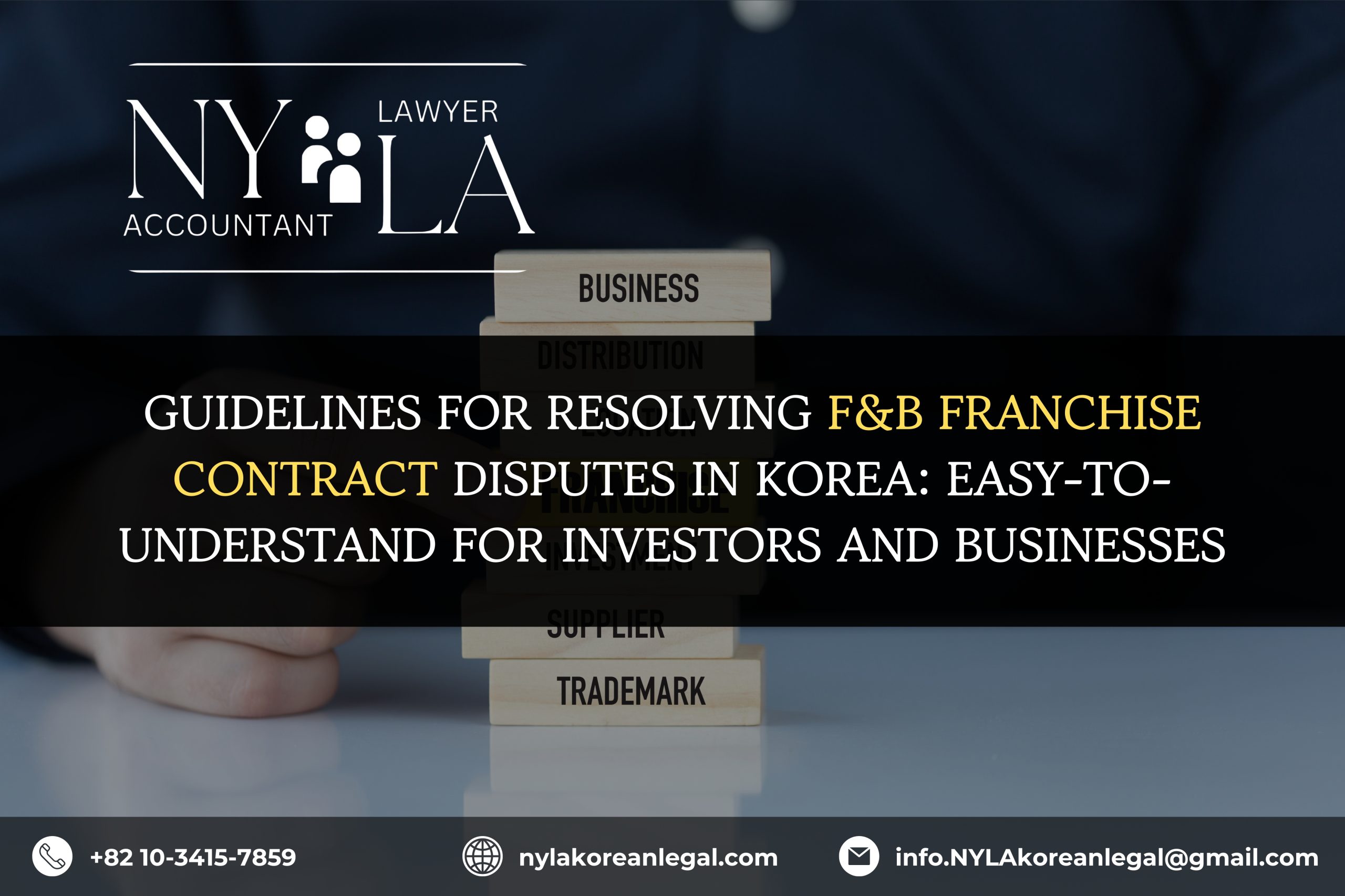Summary
I. Legal basis
- Fair Transactions in Franchise Business Act
- Enforcement Decree of the Fair Transactions in Franchise Business Act
- Civil Code of the Republic of Korea
- Commercial Code of the Republic of Korea
II. Overview of franchise contract disputes in the F&B sector in Korea
In the F&B (Food & Beverage) sector, a franchise agreement serves as a key legal instrument between the franchisor and the franchisee. However, disputes may arise during the course of cooperation due to differences in expectations, understanding, or performance of obligations. A clear understanding of the dispute resolution mechanisms in Korea will help the parties protect their legal rights.

III. Forms of dispute resolution
1. Mediation
Mediation is a common and encouraged method in Korea. Theo Điều 16 của Luật Giao dịch Công bằng trong Kinh doanh Nhượng quyền, Under Article 16 of the Fair Transactions in Franchise Business Act, the Franchise Transaction Mediation Committee has been established within the Korea Fair Trade Mediation Agency (KOFAIR) to resolve disputes between franchisors and franchisees. The parties may request mediation when a dispute arises from a franchise agreement.
2. Arbitration
Arbitration is an out-of-court dispute resolution method in which the parties agree to have one or more arbitrators decide the case. Korean courts recognize and enforce international arbitral awards, including those issued by the Korean Commercial Arbitration Board (KCAB). However, it should be noted that arbitration clauses in franchise agreements must comply with the mandatory provisions of Korean law to ensure legal validity.
3. Court
When mediation and arbitration methods are unsuccessful, the parties may bring the case to court. The Korean Court system consists of three levels: District Court, High Court, and Supreme Court. Disputes related to franchise agreements are typically resolved at the District Court, with the right to appeal to higher Courts if necessary.
IV. Dispute resolution procedure
1. Before filing a lawsuit
Before bringing a case to Court, the parties should take the following steps:
- Review the contract carefully: Identify the clauses related to disputes and the obligations of each party.
- Gather evidence: This includes meeting minutes, emails, messages, invoices, financial reports, etc.
- Seek legal advice: Consult a lawyer or legal expert to fully understand one’s rights and obligations.
2. Filing a lawsuit in Court
If mediation is unsuccessful, the parties may file a lawsuit at the District Court. The procedure includes:
- Filing a lawsuit: Clearly state the claims and legal grounds.
- Trial proceedings: The court will review the case, summon the parties, and issue a preliminary judgment.
- Appeal: If a party disagrees with the preliminary judgment, they may appeal to the High Court.
3. Enforcement of judgment
After the final judgment is rendered, if the losing party does not voluntarily comply, the prevailing party may request the enforcement authority to carry out compulsory measures, such as asset freezing, wage garnishment, or auctioning of assets, among others.
V. Key regulations to note
1. Transparent information prior to signing the contract
Before signing a franchise agreement, the franchisor must provide the franchisee with a disclosure document in the format prescribed by the Korea Fair Trade Commission (KFTC). This document must be provided at least 14 days prior to signing the agreement, or 7 days if the franchisee has received legal advice.
2. Right to refuse contract renewal
The franchisor has the right to refuse the renewal of a franchise agreement for justifiable reasons, such as a serious breach of contractual obligations by the franchisee. However, such refusal must comply with the statutory requirements regarding notice and timing.
Acts such as threats, coercion, discrimination, or retaliation against franchisees for participating in collective activities are considered an abuse of authority and a violation of the law. For example, the BBQ Chicken case was penalized by the Korea Fair Trade Commission (KFTC) for retaliatory actions against members of the franchisee council.
VI. Conclusion
A clear understanding of the dispute resolution mechanisms in F&B franchise agreements in Korea is crucial for protecting the legal rights of the parties. The parties should strictly comply with legal regulations, fully perform their notification and disclosure obligations, and select appropriate dispute resolution methods to achieve the best possible outcomes.
VII. About NYLA – Korean Legal Office

■ NYLA – Your Trusted Legal Partner in Korea
At NYLA, we understand that the success of foreign businesses in Korea requires not only a solid business strategy but also reliable legal support. With a team of experienced Korean attorneys and legal professionals, NYLA provides tailored legal services for companies, investors, and individuals operating or planning to establish a presence in Korea.
We support our clients throughout the entire business journey with comprehensive services, including:
- Legal consultation on company establishment, taxation, and immigration;
- Advice on commercial real estate, franchising, and product distribution;
- Support in human resources, marketing, and business strategy.
In addition to legal advisory, NYLA also represents clients in civil litigation cases related to business, labor, marriage, family, and inheritance to ensure their rights and interests are fully protected.
■ Contact NYLA

If you’re a foreign business or individual looking for a reliable legal partner in Korea, NYLA is here to help. We are committed to delivering effective, practical, and personalized legal solutions for every client.
With a proven track record of assisting hundreds of international clients, our team is equipped to help you navigate complex legal challenges—whether it’s commercial disputes, contract issues, or foreign investment guidance.
Don’t let legal matters hold you back. Let NYLA be your trusted guide in the Korean market.
■ Get in touch with NYLA for expert legal support
| Website: https://nylakoreanlegal.com/
FB: https://www.facebook.com/nyla.koreanlegal Tiktok: https://www.tiktok.com/@nylakoreanlegal Youtube: https://www.youtube.com/@NYLA-xd8qx Email: info.NYLAkoreanlegal@gmail.com SĐT: +82 10-3415-7859 |
 |






















































